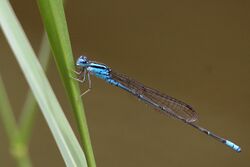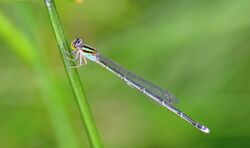Biology:Pseudagrion malabaricum
| Pseudagrion malabaricum | |
|---|---|

| |
| male | |

| |
| female | |
| Scientific classification | |
| Domain: | Eukaryota |
| Kingdom: | Animalia |
| Phylum: | Arthropoda |
| Class: | Insecta |
| Order: | Odonata |
| Suborder: | Zygoptera |
| Family: | Coenagrionidae |
| Genus: | Pseudagrion |
| Species: | P. malabaricum
|
| Binomial name | |
| Pseudagrion malabaricum Fraser, 1924
| |
Pseudagrion malabaricum,[2][1] Malabar sprite, jungle grass dart,[3] is a species of damselfly in the family Coenagrionidae. It is found in India , Sri Lanka, and Myanmar.[1][4]
Description and habitat
It is a medium-sized damselfly with blue eyes, dark on top. Back of the head is black in adults. Its thorax is azure blue with broad black dorsal, medial and humeral stripes. Abdominal segments 1 and 2 are blue with black marks on the dorsum. Mark on segment 2 looks like a chalice or thistle-head. Segments 3 to 7 are black on dorsum and blue on the sides. Segments 8 and 9 are blue with narrow black apical annules. Segment 10 is black on dorsum and blue on the sides. Superior anal appendages are black, diverging outward, and curving inward on the apices. They are smaller than segment 10; but not as small as those of Pseudagrion australasiae. Inferiors are very small.[5]
Eyes and thorax of the female is bluish green, marked as in the male. Color of the abdomen is similar to the male; but paler. Segments 8 and 9 are also black with fine apical blue rings. Segment 10 is pale blue.[5]
It breeds in ponds, lakes, paddy fields and marshes in the hills.[5][6][7][3][8]
See also
- List of odonates of India
- List of odonates of Sri Lanka
- List of odonates of Myanmar
References
- ↑ 1.0 1.1 1.2 Pal, M. (2011). "Pseudagrion malabaricum". IUCN Red List of Threatened Species 2011: e.T167297A6325176. doi:10.2305/IUCN.UK.2011-1.RLTS.T167297A6325176.en. https://www.iucnredlist.org/species/167297/6325176. Retrieved 20 November 2021.
- ↑ "World Odonata List". University of Puget Sound. https://www.pugetsound.edu/academics/academic-resources/slater-museum/biodiversity-resources/dragonflies/world-odonata-list2/.
- ↑ 3.0 3.1 "Pseudagrion malabaricum Fraser, 1924". India Biodiversity Portal. http://indiabiodiversity.org/species/show/228179.
- ↑ K.A., Subramanian; K.G., Emiliyamma; R., Babu; C., Radhakrishnan; S.S., Talmale (2018). Atlas of Odonata (Insecta) of the Western Ghats, India. Zoological Survey of India. pp. 175–176. ISBN 9788181714954.
- ↑ 5.0 5.1 5.2 C FC Lt. Fraser (1933). The Fauna of British India, including Ceylon and Burma, Odonata Vol. I. Red Lion Court, Fleet Street, London: Taylor and Francis. pp. 284-286. https://archive.org/details/FraserOdonata1.
- ↑ C FC Lt. Fraser (1924). A Survey of the Odonate (Dragonfly) Fauna of Western India and Descriptions of Thirty New Species. pp. 494–495. http://faunaofindia.nic.in/PDFVolumes/records/026/05/0423-0522.pdf.
- ↑ Subramanian, K. A. (2005). Dragonflies and Damselflies of Peninsular India - A Field Guide. http://www.ias.ac.in/Publications/Overview/Dragonflies.
- ↑ "Pseudagrion malabaricum Fraser, 1924". Odonata of India, v. 1.00. Indian Foundation for Butterflies. http://www.indianodonata.org/sp/394/Pseudagrion-malabaricum.
External links
Wikidata ☰ Q1839656 entry
 |






